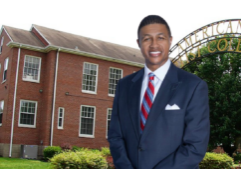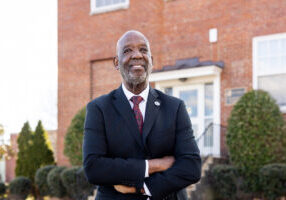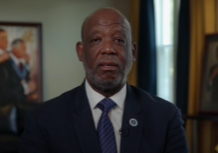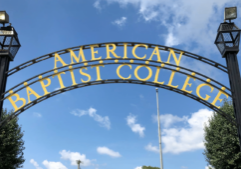A Black History Message by President Forrest Harris | Delivered at the Interdenominational Minister’s Fellowship, February 3, 2021
At this moment, it is truly humbling to stand before the Interdenominational Ministers Fellowship to share in the hollowed and honored sacred tradition, something you pastors do regularly, that of preaching the gospel. Your invitation comes at a vulnerable time in struggles of a dark context in the nation. Over many decades in black history, we have known tremendous crisis, loss, and trauma. Still, today, pandemic losses, violations against our common humanity over the last four years place heavy grief, tremendous mental health needs, and overwhelming suffering upon the shoulders of families, black and brown communities across this country.
We are all in diverse ways of ministry and caring trying to hold it together. Our struggle for meaning and clarity is seemly hidden in the dark excesses of hate-based conspiracy theories and against the truth, while people are dying in the womb of human possibilities. The delivery systems of our democracy are being compromised by polarizing xenophobia, racial and political partisanship, bringing forth more social deformity at its worst, and within our democracy, stillborn moral mandates at its best. But something is kicking in the belly of this catastrophe, struggling to be born in and beyond us. A turning point for our faith is upon us. My prayer is that has long as God gives us breath, we must search to find hope. Thus, I address you with this theme – A Turning Point for Faith.
Any preaching in these unprecedented times must speak with a heavy burden to bear the gospel’s good news against the moral blight and plight of our nation’s bad news. Yet we must stand in the throes of spiritual pain, not ready to forfeit the vision, the genuine hope, the maturity of love to reassert our loyalty to what Rev. James Lawson calls the “Jesus-eonian” way of faith. So, bear with me as I shall read for this occasion, a scriptural passage that sounds ominous, a doomy pronouncement with apocalyptic tones. It is a text pushing the religion of first-century Jews up against a wall of no escape. The initial impact of hearing of Jesus’ word is unimaginably shocking. The disciples did not expect the words they heard. Jesus speaks of an imminent destruction of the Jewish citadel of sacredness and spirituality; it would be the kind of destruction where the egoism of tradition dies, statues bearing cherish symbolism and history fall ruin to ashes. But before reading the scriptural account, I offer a warning as news commentators often do when they display disturbing images to report bad news. The images and metaphors in the text might be offensive to traditional dependency on worn out orthodoxy and piety, old religious doctrines of conservative evangelicalism.
Matthew 24: 1-13 reads:
And he went out and departed from the Temple: and his disciples came to him to show him the Temple’s buildings. And Jesus said unto them, See ye, not all these things? Verily I say unto you; there shall not be left here one stone upon another, that shall not be thrown down. And as he sat upon the mount of Olives, the disciples came unto him privately, saying, Tell us, when shall these things be? And what shall be the sign of thy coming, and of the end of the world? And Jesus answered and said unto them, take heed that no man deceive you. For many shall come in my name, saying, I am Christ; and shall deceive many. And ye shall hear of wars and rumors of wars: see that ye be not troubled: for all these things must come to pass, but the end is not yet. For nation shall rise against nation, and kingdom against kingdom: and there shall be famines, and pestilences, and earthquakes, in divers’ places. All these are the beginning of sorrows. Then shall they deliver you up to be afflicted and shall kill you: and ye shall be hated of all nations for my name’s sake. And then shall many be offended, and shall betray one another, and shall hate one another. And many false prophets shall rise and shall deceive many. And because iniquity shall abound, the love of many shall wax cold. But he that shall endure unto the end, the same shall be saved.
I will stop here; the chapter goes on with tones of end times for the old-world Moses-tradition of Judaism. And by implication mandating that God’s moral alternative of mercy, justice, and faithfulness stands even against the Roman colonial reality in which the Jews were oppressed. At the risk of sounding pessimistic, one senses a reluctance in Jesus to speak these words. Everything about this pronouncement is threatening, forbidding, intimidating, inauspicious about the future. Jesus says out of radicality of love, a kind of prophet Jeremiah-type of passion, a mixture of heart brokenness over failure and a warning of the consequences. You sense Jesus’ pleading for Jews to accept God’s politics of compassion over the refusal to embody the highest values of the kingdom of God. Jesus foregrounds this warning catastrophe with teaching and ministry that unearths and uncovers the beauty and sacredness of a kingdom of love wed to compassion and justice. But they refuse. Rather they stayed with the exclusionary practices of Judaism’s way of religion, biases of group solidarity, abuses, and disdain for the poor and sinners, which in their spiritual ineptitude became complicit with the authoritarian dominance of Roman imperial power and oppression. Seeing this, it compels Jesus to speak and warn them of the consequences.
One day on a tour of the Jerusalem Temple, the disciples thought Jesus would be impressed with the large colonnade, archways, massive columns, vast courtyard, and Holy place. But what aroused the prophetic outrage of Jesus was not the Temple itself, but what it had become, a laundering den for robbery, money, and trade; a Temple cult exploiting the poor before the face of God. The Temple had become a symbolic contradiction of the Abrahamic covenant and spirituality, its activities a reversal of a political commitment to honor the heart of God. Jesus’ warning was not as much apocalyptic as it was prophetic. The implication being that human endeavors, all earthy kingdoms, cathedrals, and temples grand and small that stand against the meaning and presence of the Kingdom of God will inevitability comes to devastation.
In our Black history, we have seen temple cults against the purposes of God perish. The temple cult of chattel slavery, the southern cultism of racial segregation have come down. As Howard Thurman tells us, “that which is against life is against God, and what is against God cannot abide.” Hearing the warning of the destruction of the Jerusalem Temple was overbearing for the disciples. They sought private consultation with Jesus. What does this mean for us? What does the future look like for those who have faith? We are at a turning point. How might our faith make a difference? How could they participate in birthing a new reality beyond the consequences?
As much as this was an urgent message for the disciples to hear, it is a challenging exegetical exercise for our faith to deal with America’s reality. The racial hate, seditious acts against our democracy in this country are the consequences of the nation not changing. Many prophets have come with warnings about the consequences of this nation’s justice failures in what many want to believe is a Christian America. History documents the human sufferings resulting from the unyielding cult of white supremacy. We have seen how the mixture of racism, the greed of capitalism, white privilege, and power cause social disparities from health, prisons, and poverty for black and brown communities.
Notably, as we celebrate Black History Month, admittedly, there is transcendent optimism to hand off our existential crisis to God to get us on the other side of today’s dark reality. We want to believe in a Christian America. But the myth of a Christian America is not unlike the Temple cult of Judaism’s failure to honor the weightier matters of “mercy, justice, and faithfulness”. Black history archives a faith that curses the darkness and failures of a Christian America to eradicate racial hate, supremacist values of privilege and superiority, a white conversative Christian conservatism that denounces Critical Race Theory but says little or nothing about QAnon conspiracy, racial subrogation, and racial hierarchy.
But there is the power of God in Black history. Red seas have been crossed, divine provisions of bread in the wilderness of domestic terrorism, strange fruit on southern trees, hardship, and oppression we’ve overcome. So today, in the face of pandemic conditions, racial hatred, economic recovery, black churches struggling to be viable institutions, and street sanctuaries of protest are pushing us to a turning point for liberating faith—this faith matters for changing and humanizing life. There is something God has put deep down in our human agency; there is a faith in our souls, that still with breath in our bodies, we must search for hope; we fight death only in the strength of life.
Or we can take refuge in safe rituals of our churches, join the frantic search for transcendent reassurances of redemptive love, and talk about how far we have come; the first woman and black woman as Vice President, Kamala Harris, and the first black man, Secretary of Defense, General Lloyd Austin. But we are as the nation at large at a turning point- a battle over history, memory, and critical faith to guide the future. We live with multiple pandemics, uncovering, peeling back, the layers of illusion that obscure the ground, not of black life only, but open-air exposure of America’s cancer of racism, the myth of Christian America that supports the cult of whiteness that is bringing this democracy close to devastation.
So here we are, standing in a liminal space, between ‘what was,’ ‘what is’ and ‘what’s next.’ It is a place forcing us into a turning point for faith, not knowing how to heal, waiting for transformation. As Franciscan Richard Rohr describes it: we are betwixt and between the familiar and the completely uncertain, unknown. We do not know how to rid ourselves or leave in the dust of an old world of racial hierarchy. We are not sure whom we can trust, who bears a commitment to a new existence, or where genuine newness can begin. We are in a liminal space, a turning point for faith, a faith that calls us to what’s next. What’s next? Is it a new form of the old-world morphing, camouflaging the myth of a Christian America? What’s next? A carrying forth of plantation Christianity and turning our backs on the brush harbor spirituality that birth the defiant faith of a Sojourner Truth, Harriet Tubman, Ida B.Wells Barnett, Malcolm X, John Lewis, Diane Nash, C.T, Vivian, and Martin Luther King. What’s next? The manipulation of Black Lives to be complicit with a non-liberating theology that causes death. What’s next? Naïve about white supremacy values hiding in public policies, electoral politics, white fragility, individualism, colorblindness, and prosperity schemes that even inhabit Black bodies, Black minds, and Black churches. Or is what’s next for our faith endorsing a Jesus movement for justice for Black lives, a Jesus movement purging whiteness from our religion, a Jesus movement to set the captives free.
In the long arc of Black history struggle for freedom, there are many turning points of faith. Some would say that the 1954 Brown vs. the Board of Education Supreme Court decision overturning years of dehumanizing segregation resulting from the Plessy vs. Ferguson decision of “separate but equal” was a decisive turning point. For the late Congressman John Lewis, a critical turning point was the murder of Emmitt Till, as the murder of Michael Brown and George Floyd was for the Black Lives Matters Movement, which led him to face violence at the foot of the Edmond Bridge for voting rights.
Richard Allen, the first bishop of the African Methodist Episcopal Church, reached a turning point of faith when he and Absalom Jones walked out of the white St. George Episcopal Church because it was a violation of the anthropocentric principle of human equality under the parenthood of God. In a memoir of his “Life, Experience and Gospel Labors,” Richard Allen, speaking to a white audience, prophetically challenge white religion with a turning point for faith:
I do not wish to make you angry but excite your attention to consider how hateful slavery is in the sight of God who hath destroyed kings and princes for their oppression of the poor slaves. Pharaoh and princes, with the posterity of King Saul were destroyed by the protector and avenger of slaves…When you are pleading with, do not reply as Pharaoh did. We wish you consider God as the first pleader of the cause of slaves… If you love your children, if you love your country, if you love the God of love, clear your hands of slavery.”
The Bible says God makes a distinction between Pharaoh’s Egyptian gods and the God of the Israelites. Israel walked across the Red Sea on dry ground while a pursuing Pharaoh’s army drowns in the Red Sea.
In a recent Los Angeles Times OPED, Richard Hughes says, “we see the last gasps of the myth of a Christian America. Conservative evangelism supports an American politician whose life and priorities are fundamentally anti-Christian witness the insurrection against cradle of American democracy; it is the last gasps of a long-standing American religion that is now passing away — the belief of Christian America sustained by a corrupted version of Christianity.”
James Baldwin once said in an interview with anthropologist Margaret Mead, “I was a revolutionary at fifteen, and I gave that up at the same time I left the church. I am another kind of revolutionary now, If I am a revolutionary at all. I might even be described as a conservative, in terms of the things I think about and want to see honored and made visible for people’s lives. What if we lived as if all people are the sons and [daughters]of God? What if our national life was truly animated by the standard of human freedom with which we began? What if the promises of the American dream were really extended to all our fellows? Our salvation is never accomplished: it must be reaffirmed every day and every hour.
Realizing where my faith and piety stands, I am reading books I read years ago about Jesus. I recently read Albert Nolan’s Jesus Before Christianity: A Short Reconstruction of the Life of the historical Jesus. Marcus Borg’s Jesus: Uncovering the Life, Teachings, and Relevance of a Religious Revolutionary. And Obery Hendricks, The Politics of Jesus: Rediscovering the True Revolutionary Nature of Jesus’ Teachings and How They Have Been Corrupted. Placing these renderings of books with the urgent message of Jesus, I raise a question: Is our faith in solidarity with Jesus. We are at a turning point of faith. We have been a turning point and threshold of change before.
What is this faith? It is faith based on the all-inclusive solidarity of humanity. It is a faith that stitches life, love, and liberation together. It is faith beyond private piety for one’s security and needs to the embracing of a communal embrace of love for sufferings of humanity. It is a faith that gave a first-century leper inclusion in the community. It is faith that welcomes the humanity of strangers, that sees in their humanity one’s own humanity. It is a faith that feeds the hungry, clothes the naked and houses the homeless with humane public policies. It is a faith that honors the heart of God in public policy. It is faith that embraces truth and does not conspire against it. It is a faith of ultimate concern for justice, mercy, and faithfulness. It is a faith for global justice. It is a faith, as national youth poet laureate Amanda Gorman describes as being “brave enough to see the light, or brave enough to be it.” It is a faith that births new beginnings in the darkness of a broken people in a divided nation. It is a faith that God’s compassion for humankind will prevail over evil.
The Jerusalem Temple was destroyed in 70 A.D. Jesus in his life and teaching, love and liberation, mercy and compassion built another Temple. The Temple Jesus built with the character of God. Jesus gave his full human agency to God. God’s compassion was the DNA of Jesus’ liberating love. Jesus made way for the Pentecost of the Holy Spirit to dwell with us. Jesus said about himself, destroy this Temple, and in three days, it will rise again. We can dwell in this Temple. With resurrection faith, God’s Spirit can channel through us a new world. Generations unborn will see mountains of injustice brought low, people in the valley of oppression lifted, and all flesh shall see it together.









